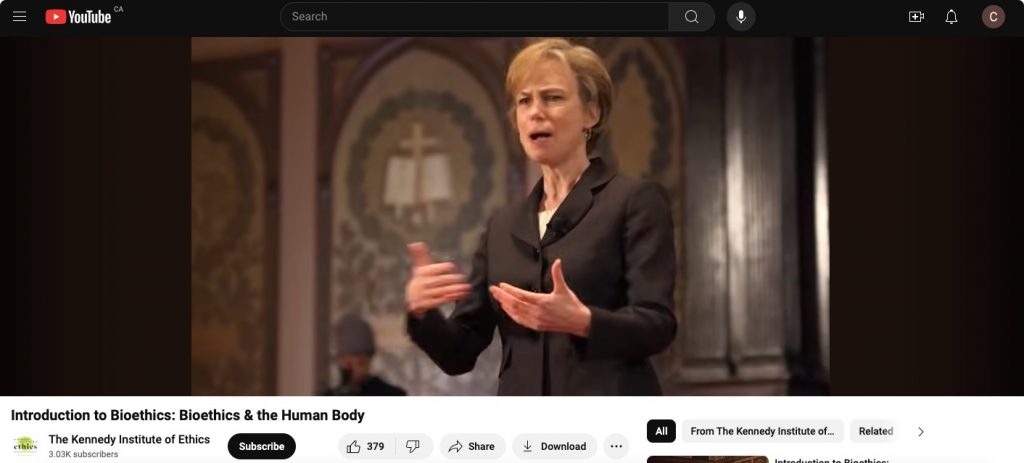The Speaker
Maggie Little is founder and Director of Ethics Lab, the Francis J. McNamara, Jr. Chair of Philosophy, and a Senior Research Scholar at the Kennedy Institute of Ethics, at Georgetown University. She is also a founding co-chair of the Tech and Society Initiative at Georgetown. Little oversees the growth of Ethics Lab’s work on campus, as well as among partners — from nonprofits to corporations to other academic institutions. She guides the focus of the Lab’s coursework on an annual basis, pushing her colleagues — and by extension, students — to examine the world’s most pressing, complex problems.
Experience
Giving a conference or a talk is always a challenge, but the more we are challenged, the more we have to practice. So after I do it many times, I’ll get experience in it. It is the same with many things in our lives. Speaking a foreign language is a matter of practice, practicing any sport, playing an instrument, making new friends, cooking, dancing, and so on.
What I see in this talk is that Dr. Little has a lot of experience in giving talks. I have seen many videos of her, and that is why I chose this video to talk about a good presentation. It’s true that this is similar to a TED talk, but what I find different is that it’s in a more academic setting.
He starts with an example of real life that grabs the attention of the students. Then, she develops the topic step by step. She starts giving simple arguments, but then she gives more elaborated ones.
I think she has a very good sense of movement on stage, she knows how to look at people – she even looks deep into the audience’s eyes – and she uses her hands and facial gestures to express herself.
I insist on the fact that she does not use any Power Point presentation. This is something that I really like. I think this is like 2000 years ago when people gathered in the “agoras” of Greek cities when people gathered to listen to speakers who had no visual aids and what attracted the audience was maybe their rhetoric and/or the topic they were talking about.
Preparation
Even if we can say that this talk was over-prepared, I think we can give Dr. Little credit for giving good talks.
She deals with very complicated topics in bioethics, and I think that her talks could be very controversial. But the way she talks motivates you to listen to everything she has to say to see how coherent she is. Even though I might not agree with some things, I think she makes very clear explanations of all the topics I have learned from her lectures.
The first think that called my attention is that she does not need any visual aid. Well, the format of the talk could be like a TED talk where she does not need any visual aid, but all the speakers I’ve seen in TED talks use any kind of visual aid. So I think that in this case there is good management of time, space, movement, the content, the relation with the public, the use of the voice, sight, and hands movement.
Fashion
I’d like to say that today talks, especially TED talks, are part of a new way of making shows and presenting ourselves in society (“presentación en Sociedad” in Spanish). I remember my mother telling me that in Colombia, when girls reach their 15th birthday, they were “presented in society” in a very important party to which they invite the mayor of the town, the priest, the head doctor, the head of the military or the police, among other personalities. for some people their presentations at conferences are like their “presentación en Sociedad”. It is the time to show our new clothes, shoes, tattoos, jewelry, earrings, hats, hairstyle, hair color, socks, etc. This is not good not bad, just that it is the time of their show for many academics.
In this case, Dr. Little is very well dressed and also introduces a way of speaking, of giving presentations.
So, this point of fashion is very subjective, and we should be aware of that, because we can judge the speakers for any of those external things and forgetting to concentrate on what is essential (this could also be essential). Many academics could be even more concentrated on these external things that in the content of their talks.
In the end, I would say that in this case of Dr Little’s talk, fashion helped her to make her talk grab the attention of the public.



I really like that you add fashion as an important element. While there is no wrong way to dress, per se, it is possible to dress to convey the message and tone you want received. And it might be an easy way to generate some of that message before you have the authority of name and reputation that can carry you through. And it provides some personal confidence, too.
Hi Emily, yes, I think you mentioned this point of confidence, which I find very interesting. Sometimes we even dress in a way that is good to show, but we don’t feel confident and that doesn’t help sometimes. I think this is something we should keep in mind. Sometimes it will be worth to think more about it, other times to be more flexible and relaxed.
Hey Carlos,
I really liked that you used headings for this, made it have an easy to follow flow which is always appreciated!
As a Classics lover myself, I enjoy that you’ve brought attention to the art of speaking they used to cultivate. I think it says a lot about an individuals presentation skill when they can stand in front of a crowd with no aids and still manage to hold their attention. I think we’ve taken such a turn toward having PowerPoints that we assume they’ll always be a good addition to a talk, as opposed to a detriment. But, when a PowerPoint is made poorly, it’s often more of what people talk about or focus on than the content of the talk itself. It would serve academia well to allow for more personal choice when it comes to how presentation is done and what aids, if any, are in use.
I also think it goes in hand with your ‘fashion’ talk. Instead of visual aids, Dr. Little made herself the visual! I may be bias for the own way I dress, but I kind of love that. And I enjoy that you’ve taken a bit of a different spin on how you approached the assessment of a talk.
Carlos –
Is it possible to be “over-prepared” for a talk? The speaker is clearly an expert in what they are describing, so, does the fact that this person has expertise result in over-preparation, or are they just stating facts that are obvious to them, but may be novel to the viewer?
What I liked about your selected speaker was their ability to switch from academic language to the vernacular (“their environment sucked”). They know when it is time in their argument to directly appeal to the audience, and they adapt to what they see and understand about them. It’s an amazing skill!
R
Honestly, I don’t know if we can be over prepared for a talk. In some ways yes, in some ways no. If we take into account all the opinions of the people, maybe not. But if just keep a bunch of them, we could say that yes. If you’re an expert in the topic, you know what you’re talking about and prepared it very well, I think that a talk can be over-prepared. In that sense, very good!
And yes, I think that this speaker has received a lot of training for public speaking!